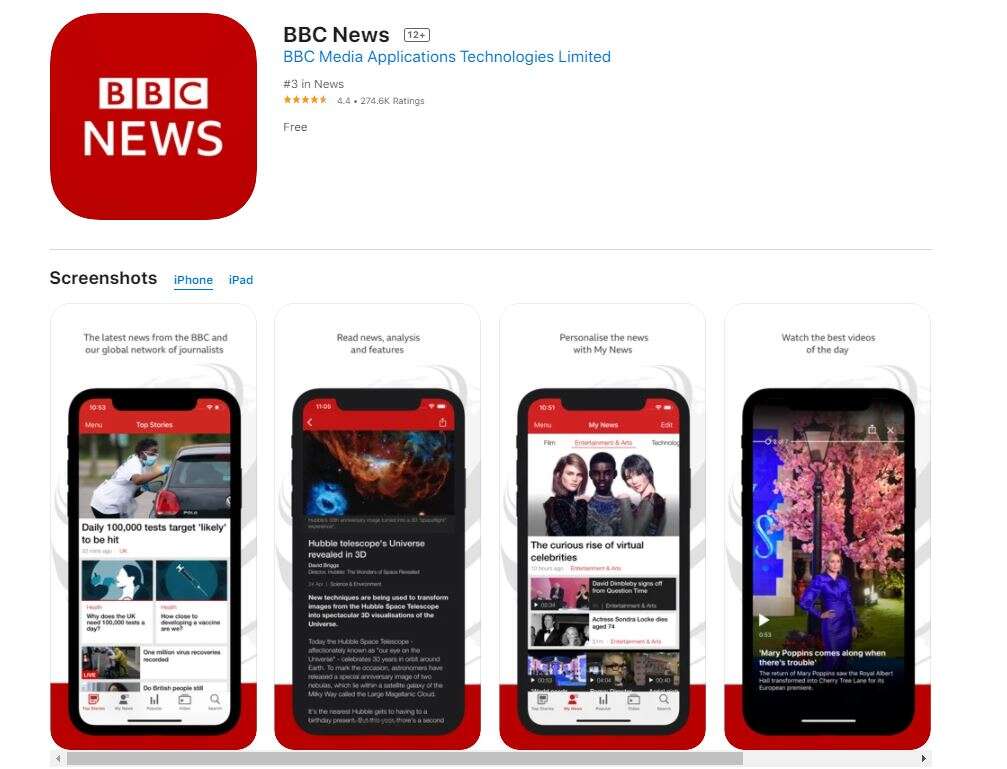
The BBC News app was downloaded 2.2 million times in 2020 making it the most popular newly-installed news app in the UK during the year. The mobile apps of other big name publishers proved similarly popular.
Sky’s news app was the second most popular with 1.1 million downloads, while the Guardian and Mail Online’s news app were also among the top ten most downloaded, according to Press Gazette’s analysis of data provided by mobile app marketing intelligence firm Sensor Tower.
In third place was Reach’s local news aggregator In Your Area.
The Sun’s news app, while making the top 15, had fewer downloads than other big name news brands with 0.2 million installs. The highly popular Apple news app, which comes pre-installed on iPhones, did not appear in the data due to Apple security rules.
“The BBC have done incredibly well in getting its news apps, the iPlayer app and other apps on home screens in the UK, but beyond that it’s very longtail,” says Nic Newman, a senior research associate at the Reuters Institute for the Study of Journalism.
Douglas McCabe, who heads media and entertainment analysis firm, Enders Analysis, says that for the UK market, total time spent on news media services on mobile – an important metric not captured in download data – is also heavily weighted towards established news brands.
News aggregators score less well in the UK than other markets such as Japan and Korea, according to Newman. “Part of the reason why aggregators haven’t taken off in the UK is that the user experience is not very good,” he says.
McCabe says that aggregators are redundant in the UK market. Instead there is likely more of a market for them in countries with less built-up media industries.
“In the UK news aggregation services have a track record of being launched, noticed and then forgotten. Real consumers are not looking for aggregators. The only aggregation they need sits within Google and Facebook, integrated within search and social,” he says.
Globally, Indian and Chinese apps dominated the market taking three of the five top spots; no surprise given their large populations. Hindi TV news channel AAj Tak’s app was the most popular app in the world in 2020, with 23.6 million downloads, whilst Indian cricket news app Cricbuzz was second with 23.2 million new users.
Award-winning News discovery app SmartNews, which uses machine learning to provide viewers with coverage from multiple viewpoints on important topics also made the top five.
Local-news focused news aggregator News Break was the most downloaded app in the US in 2020. The app has seen huge success since it was launched in 2016 by Taiwanese-American internet entrepreneur and Yahoo!Inc co-founder, Jerry Yang and Chinese tech executive, Jeff Zheng.
Apps from right-wing and conservative publishers also made a strong showing.
Cable stalwart Fox News’ app was fourth most popular with 3.8 million installs, while Fox challenger, News Max TV also scored well with 2.5 million downloads for its app. The app from far-right pro-Donald Trump network, One America News also made the top fifteen with 1.2 million installs. The controversial network was temporarily suspended by YouTube in November for promoting fake news and conspiracy theories.
Read more: See Press Gazette’s exclusive ranking of the world’s top 50 news websites.
Newman is not surprised at the popularity of conservative apps among consumers of right-wing and conservative news. “People who download apps are loyal users who are very interested in the news,” he says.
When it comes to ratings for the top-downloaded apps, UK audiences rated sports news apps best. Flash Score and One Football were the best-rated apps, each scoring an average rating of 4.5 in the Google Play and iOS stores. Among the least well-rated was Mail Online’s apps, which scored just 2.7 with users down-rating the app for among other things, intrusive pop up advertising. Sports apps were also the most-liked globally with Flash Score and Cricbuzz scoring best.
Publishers had previously grappled with the question of whether to focus more efforts and resources on high quality mobile websites or on apps. However, improvements in technology have meant both are now essential for publishers.
“The question about one or the other has essentially vanished,” says McCabe.
Although Newman says that apps are still a “minority sport”, they have, he says, seen a revival.
The shift away from reach to engagement has underpinned this comeback since apps along with other direct tools such as email newsletters help build a deeper connection with audiences – essential in a news market where publishers can no longer survive on traffic alone. They also provide publishers with important personal information on users.
Tablet apps according to McCabe are important in this regard.
“Tablet Apps have been underrated by publishers,” he says. “Ten years ago [when the iPad was launched] they were going to save the industry. Then, over the next three to four years, they were dismissed as a distraction. But tablets have become important mass-market second devices, and they represent the best opportunity for publishers to promote their brand with loyal readers, the best opportunity to replicate the layout and hierarchy of a print newspaper. For subscriber businesses — the Times, for example — the tablet App generates a huge proportion of time spent with the brand.”
Email pged@pressgazette.co.uk to point out mistakes, provide story tips or send in a letter for publication on our "Letters Page" blog

